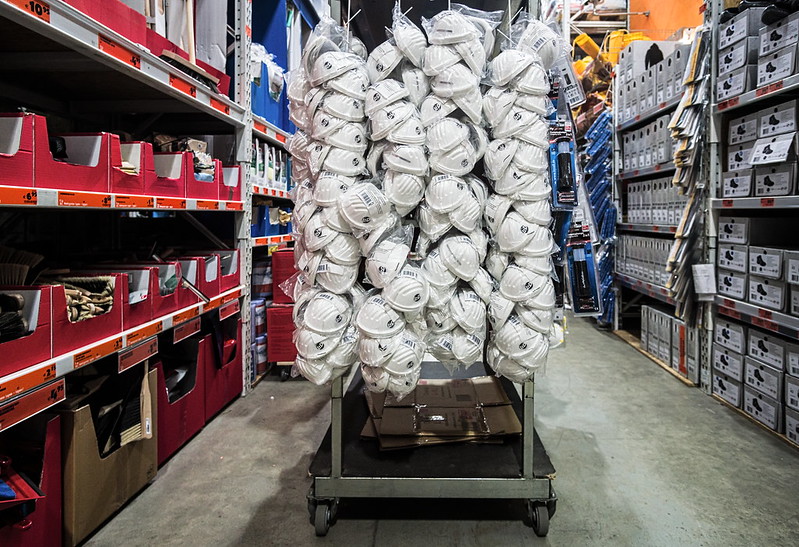Coronavirus Infection Rates Rise in U.S., as China Curbs the Virus’s Spread; Justice Department Charges Two Chinese Nationals

Coronavirus Spreads Quickly in the United States, as China Curbs the Virus’s Spread
Having infected more than 100,000 people globally, the novel coronavirus, which causes the respiratory disease COVID-19, has spread to most U.S. states, as the official infection total surpassed 1,000. Seattle, New York City and Los Angeles have been among the hardest-hit cities thus far, and experts have warned that significant community spread appears nearly inevitable. On Monday, as COVID-19 created panic among investors, Wall Street had its worst day in a decade; trading had to be suspended for a period of 15 minutes to prevent stocks from crashing.
Congress passed and President Trump signed an emergency funding package providing $8 billion to respond to the COVID-19 outbreak. A handful of U.S. governors have declared states of emergency in response to the outbreak. While the particulars vary from state to state, declaring a state of emergency typically frees up funds for state governments to respond to a crisis and may allow them to more quickly hire private contractors to provide necessary services. But declaring a state of emergency does not necessarily entail shutting down large gatherings, requiring businesses or schools to close, or otherwise restricting movement. Still, a number of schools have closed of their own accord, and some businesses have advised employees to work remotely.
In Washington, Governor Jay Inslee has banned meetings of more than 250 people in three counties hit hard by the virus. In New Rochelle, New York, officials set up a one mile “containment zone” within which residents were asked to remain home. States have the legal authority to enforce broad restrictions on travel and movement, and experts have argued that the current containment measures will not be enough to prevent the virus’s spread through American communities. Anthony Fauci, the director of the National Institute of Allergy and Infectious Diseases, has said that regional lockdowns could become necessary. He further recommended that the elderly and those with underlying health conditions abstain from travel.
The Trump administration has come under fire for its handling of the virus. In the early stages of the global outbreak, critics say that the administration provided overly optimistic reports of the likelihood of the virus spreading in the United States, for fear that a more cautionary tone would have political and economic repercussions. The Trump administration also decided to forgo testing kits for the coronavirus supplied by the World Health Organization; these kits would have been valuable to detect early cases in the United States. Moreover, the Centers for Disease Control and Prevention (CDC) initially issued faulty testing kits, while bureaucratic obstacles prevented other facilities in the United States from designing their own tests. Now, health care facilities can develop and administer their own tests. But in part because of these early failures, the United States has administered far fewer tests than other developed countries to which the virus has spread, increasing the likelihood that people could be spreading the disease without knowing they have it.
Meanwhile, China has reported progress on the virus. President Xi Jinping visited Wuhan, where COVID-19 cases first began to emerge in January, as Beijing claimed that it had succeeded in containing the virus’s spread outside of Hubei province, where Wuhan is located. Since China first reported cases in Wuhan in January, it has been hardest hit by COVID-19. To date, more than 80,000 people have been infected with the virus and more than 3,000 have died from the disease. China has also sent experts and supplies to Italy, which has the highest number of coronavirus infections outside of China. Beijing has also pledged some $20 million to the World Health Organization to help poor countries improve public health as the virus spreads.
As the virus has spread more rapidly in Europe and North America, the Chinese Communist Party has publicly doubted that the coronavirus began in China, although experts agree that the virus originated in Wuhan. The United States has taken a different approach. Despite World Health Organization guidelines to the contrary, Secretary of State Mike Pompeo has continually referred to the coronavirus as “the Wuhan virus.” Analysts have argued that the naming choice has political aims: It seeks to associate the virus with China as Beijing seeks to distance itself from it.
Justice Department Charges Chinese Nationals With Aiding North Korean Hackers
The Justice Department on March 2 indicted two Chinese nationals, Tian Yinyin and Li Jiadong, for assisting North Korean hackers with stealing cryptocurrency in 2018. The indictment alleges that Li and Tian laundered nearly $101 million of stolen proceeds through cryptocurrency transactions in order to disguise the funds from law enforcement. In total, the North Korean hackers involved had stolen about $300 million from cryptocurrency exchanges, according to the Justice Department. Following reports of the indictment, Tian denied knowing the funds were stolen at the time he laundered them.
On March 6, the U.S. government took further actions. The Justice Department filed an updated criminal complaint alleging that North Korea had funneled stolen funds from accounts named in the initial complaint into an escrow account, out of reach from U.S. authorities. That same day, the Treasury Department’s Office of Foreign Assets Control placed sanctions on Tian and Li as well as various cryptocurrency accounts associated with their alleged activities.
U.S. government officials have long believed that China helps North Korea execute cybercrimes by providing the country with computer infrastructure and personnel assistance. In 2018, for instance, the Treasury Department claimed that other North Korean hackers charged by the Justice Department had operated out of China. Still, the March 2 allegations represent a more aggressive U.S. approach toward China than it has taken in the past. The charges are believed to be the first time that the U.S. has indicted Chinese nationals for assisting North Korea in cybercrime. Officials have characterized the indictments as signaling a commitment to crack down on sanctions violations. FBI Assistant Director Calvin Shivers said the charges send “a strong message” that the U.S. “will not relent in holding accountable” those who “evade sanctions.”
Over the past month, other allegations of Chinese actors violating North Korea sanctions have emerged—suggesting China’s ties with the country may raise tensions with the U.S. going forward. On Feb. 13, the Justice Department announced new allegations against Huawei, accusing the company of violating North Korea sanctions and lying to the U.S. government about its operations in the country. And on March 4, the Center for Advanced Defense Studies—a D.C.-based think tank—reported that North Korea had sold sand to China last year in violation of U.N. sanctions. (Although China has advocated easing sanctions on North Korea, it claims that it fully complies with sanctions imposed by the U.N. Security Council.)
The Justice Department indictments of Li and Tian also follow a spate of legal challenges levied against China in recent weeks. On Feb. 10, the Justice Department announced indictments against members of the People’s Liberation Army for hacking Equifax in 2017 and stealing the personal data of nearly 150 million Americans. And the Justice Department’s Feb. 13 superseding indictment against Huawei accused it of violating sanctions on Iran, racketeering and a long history of trade-secrets theft.
China has gone on the offensive in response to these allegations. On March 4, Chinese cybersecurity firm Qihoo 360 released a report alleging that the CIA has conducted cyber espionage against Chinese companies and government agencies for the past 11 years. Although much information in the report was already publicly known, analysts see its release as a rebuke to recent U.S. indictments over cybercrimes—as well as a response to broader technology-policy tensions. Huawei has pleaded not guilty to charges brought against it, and last month it filed its own lawsuit in U.S. courts against Verizon for patent infringement.
Other News
In Italy, where about 500 people have died from COVID-19, the government has placed the entire country of 60 million people under special quarantine restrictions. According to the restrictions, travel will be allowed only for “urgent, verifiable” work reasons or emergencies. Public events are to be shut down, and schools, movie theatres, churches and other places where people congregate are to remain closed. But analysts say that enforcement of the quarantine measures has been mixed: On Monday, even in Lombardy, the region hit hardest by the virus, police had not set up checkpoints or otherwise regulated travel by air or by train, even though quarantine restrictions were technically in place. The intensive care unit coordinator for Lombardy said the province’s health care system was on the brink of collapse, as COVID-19 cases required hospitals to turn away patients with other serious conditions. Some have argued that Italy’s travails with the virus are a harbinger of things to come in the rest of Europe, as significant outbreaks have been reported in France, Germany, and Spain, among other countries.
Experts fear that the Iranian government has significantly underreported the number of cases in the country. Many Iranian officials have tested positive, and some have died from the illness. The Iranian government has imposed broad restrictions on movement and required quarantines. But the country’s weak health care system and tight controls on media have led experts to believe the virus may be especially difficult to contain in Iran.
Netizens in mainland China—notably without a clear connection to the Chinese government—appear to have mounted an online disinformation campaign targeting Taiwan, in an effort to manipulate Taiwanese netizens into believing that the Taiwanese government had underreported death totals from the coronavirus to maintain stability. Users on Chinese social media sites admitted to spreading disinformation targeting people in Taiwan.
Commentary
In the New York Times, Xie Feng defends how China has handled the coronavirus outbreak and urges nations to collaborate with the CCP in stopping the illness. For the Diplomat, Tobias Burgers and Scott N. Romaniuk examine how the coronavirus crisis could strengthen China’s authoritarian regime. In Foreign Affairs, Yanzhong Huang explores how distrust between the U.S. and China fosters conspiracy theories about the coronavirus—and how they harm efforts to contain the disease—while Thomas J. Bollyky and Vin Gupta write about lessons the world can learn from China’s coronavirus experience. In the Telegraph, Sophia Yan discusses how China’s coronavirus propaganda efforts are backfiring.
For the New York Times, Eric Schmidt explains how the U.S. could fall behind China in technological innovation—and why Silicon Valley needs the government’s help. In Foreign Policy, Steven Butler writes that U.S. expulsions of Chinese media workers will only benefit China. For the Mercator Institute, Lucrezia Poggetti and Max J. Zenglein argue that Chinese economic retaliation should have only limited impact in European nations’ decisions about including Huawei in their 5G infrastructures. In the Wall Street Journal, Benedict Rogers contends that China’s recent imprisonment of Swedish citizen Gui Minhai snubs the rule of law and international human rights.
For Lawfare, Sheena Chestnut Greitens, Myunghee Lee and Emir Yazici dissect China’s rationale for repressing Uighurs and other ethnic minorities in Xinjiang and elsewhere. William Ford describes congressional hearings over possible U.S. government responses to the coronavirus. Charlotte Butash unpacks the Feb. 11 Justice Department indictments of Huawei. In the Fault Lines podcast, hosted on Lawfare, Lester Munson discusses China’s massive investments in Africa.






